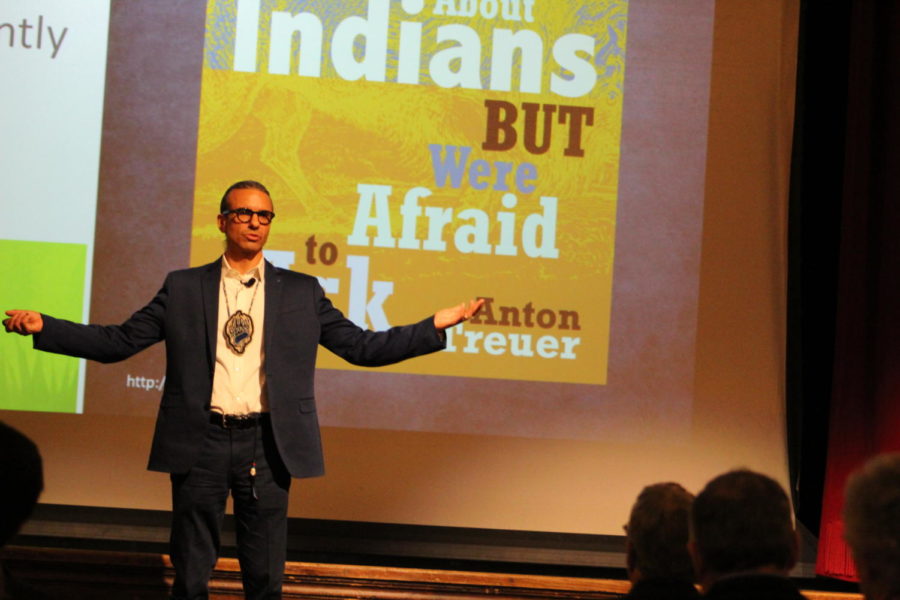Author speaks about frequent questions regarding Native Americans
Anton Treuer gives a lecture based in part on one of his 14 books, “Everything You Wanted to Know About Indians But Were Afraid to Ask.”
April 4, 2019
Members of the Ames and Iowa State community gathered to ask questions and learn more about Native American people and cultures.
Over 300 people gathered in the Great Hall of the Memorial Union Wednesday, at 7 p.m. to listen to professor and author Anton Treuer give a lecture based in part on one of his 14 books, “Everything You Wanted to Know About Indians But Were Afraid to Ask.”
A member of the Ojibwe tribe, Treuer, answers over 120 questions in his book about Native Americans, among the topics discussed are tribal languages to the real story of Thanksgiving.
Treuer’s lecture marked the 46th Richard Thompson lecture, a yearly collaboration where a prominent Native American comes to Iowa State to speak about topics relating to Native Americans.
While he offered his personal experiences, Treur said it was important to note that a single story cannot define the entire Native American experience.
Treuer spoke about the lack of engagement with Native American people, language and perspectives in academia, but also in society as a whole. Even in history books, Treuer said, Native American history is told from white perspectives.
“There is a lot lost in that many layers of filtration and translation,” Treuer said, “So, instead of ‘Indian Inspired’ how about ‘Inspired Natives.’”
The racially predictable achievement gap in academia, Treur said, is contributed to by not giving enough information that relates to students of color. Treuer said that the fact that he was able to go through all of his elementary schooling and not learn any information that related to his identity delivered him an unspoken message.
“Intentions don’t tell you impact, and the absent narratives delivered the message to me that you and yours are not important, not relevant, don’t matter,” Treuer said.
Treuer discussed his own identity, his family’s story and his life growing up. Treuer did this because he said all perspectives are different, and he wanted to let attendees understand the experiences behind his perspectives.
Growing up, Treuer described the differences in his experiences when he was young growing up in Minnesota growing wild rice, where he said some of his fondest memories lie. He also spoke about his family moving to Washington D.C., and some of the good and bad memories related to growing up in a predominately white space. Treuer said he specifically remembered an experience where a first grade teacher of his thought it would be funny to make him wear a dress, as he was a boy with long hair.
Audience engagement was a large part of Treuer’s lecture, and attendees were able to participate in an open question and answer segment where they could ask Treuer questions. Topics of discussion included gender dynamics within Native tribes and the harmfulness of mascots which portray caricatures and stereotypes of Native Americans.
Alex Mullins, a graduate student in ecology and evolutionary biology, asked Treuer a question about casinos and if they could be seen as a form of cultural assimilation in Native American communities.
“I was kind of under the impression that it might have just been casinos in general, I think a lot of people see them as a method of assimilation,” Mullins said, “So, it was interesting to get [Treuer’s] perspective and insight on what they represent and the benefits and cons to casinos on reservations.”
Treuer said he hoped people who attended the event would have active and continued response to his lecture, and continue to seek more knowledge and engagement with Native American perspectives and cultures.
“I hope that [attendees] get more than a takeaway,” Treuer said. “I hope it will spark curiosity and questioning and leaning in and further inquiry in learning, I hope we stirred the pot and the ripples will keep going on from there.”
Attendees were given an opportunity to meet Treuer, purchase his book and have it signed after the event.







